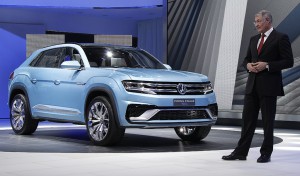It is, by far, the largest seller of diesel passenger cars on the American market, but in the wake of its embarrassing and costly emissions scandal, Volkswagen is planning to cut back the number of diesel products it will offer in the U.S. – at least for the coming year.
The decision to withdraw a request for regulators to certify some of its new models comes at the same time VW is working with the EPA to develop a fix for 482,000 diesels already sold in the States that were equipped with software designed to cheat on emissions tests. In real-world use, they may produce as much as 40 times the legal limit of pollutants such as smog-causing oxides of nitrogen.
VW’s new CEO Matthias Mueller said this week the automaker plans to begin repairing the 11 million small diesels it sold worldwide with so-called “defeat device” software starting in January. But the U.S. recall could take longer to start. And there is concern that many current owners simply may refuse to get their vehicles repaired.
(For more on the global VW diesel recall, Click Here.)
With only a few exceptions, notably in the State of California, there is no way to actually force owners to respond to a recall. That’s one reason why even the most dangerous safety defects see barely 70% of vehicle owners eventually get their vehicles repaired. That slips to as low as 30% on less pressing safety issues, according to data from the National Highway Traffic Safety Administration. And the response rate is typically lower for emissions-related recalls.
“There is no enforcement mechanism that is tied to the consumer’s ability to continue driving the vehicle,” Jared Allen, a spokesman with the National Auto Dealers Association, told the Reuters news service.
That said, federal regulators have been pressing manufacturers to take whatever steps possible to encourage more owners to fix their vehicles in a recall. Honda recently launched a national ad campaign related to airbag problems. General Motors offered financial incentives for motorists to respond to an ignition switch recall. And Fiat Chrysler is offering a buyback for some Ram pickups that have seen a low recall response rate.
Before a recall for the diesel problem can begin, however, the U.S. Environmental Protection Agency must approve plans submitted by Volkswagen. That process has been complicated by the fact that the automaker has twice updated its 2.0-liter WA 189 diesel engine since it was introduced seven years ago. Each version likely will require a different fix, ranging from new software to updated hardware.
“There are three groups of vehicles involved … Each will require a different remedy, but these remedies can only be our first step for our customers,” noted Michael Horn, CEO of Volkswagen of America, in written testimony to the House Energy and Commerce Subcommittee on Oversight and Investigations.
The emissions scandal could be an “existence-threatening issue,” warned the maker’s new chairman this past week. And with government investigations and consumer lawsuits mounting, observers expect the crisis to cost far more than the $7.3 billion VW has so far set aside.
(Diesel scandal an “existence-threatening crisis,” warns new VW chairman. Click Here for more.)
A question that likely will nag VW for some time is how the crisis will impact sales. A study by consulting firm AutoPacific, Inc. shows the vast majority of American motorists have lost respect for the German maker. Meanwhile, KelleyBlueBook reports the value of used VW diesels has plummeted on the auction market in recent weeks.
VW has been the largest seller of diesels in the U.S., the vehicles accounting for about 25% of the products it sells in America. But that figure is all but certain to fall, at least in 2016, as the maker has chosen not to have some diesel models certified for the coming model-year.
Whether it will again try to market a full line-up in subsequent years could depend upon the response its remaining models get in the wake of the diesel scandal.
(2016 Chevrolet Colorado Diesel deserves a close look despite VW scandal. Click Here for the review.)



The States could do it easily, no plate issued to any vehicle without recall compliance. And for the Feds, no road funds unless the States comply.